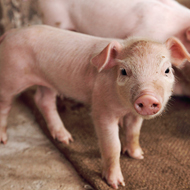
Tougher new rules come into force in March
In just over a month, porcine epidemic diarrhoea (PED) will become a notifiable disease in Scotland.
The country's animal health laws are being strengthened as part of a plan to protect its £95 million pig industry.
Similar legislation was introduced in England in December last year.
PED is caused by a virus and leads to severe gastrointestinal disease. It can spread rapidly through a herd by indirect contact.
A new, highly pathogenic strain was discovered in China in 2012 that causes 80-100 per cent piglet mortality. This strain has since spread across North America and, more recently, it was detected in the Ukraine.
From 2 March 2016, any suspected case of infection must be reported to Quality Meat Scotland (QMS).
The new rules place responsibility on pig keepers, veterinary surgeons who examine pigs/pig carcases and persons who suspect infection after analysing a sample taken from a pig or pig carcase.
Scotland's rural affairs secretary Richard Lochhead said: "Strengthening Scotland's animal health legislation to make PED a notifiable disease will ensure industry can act quickly and effectively to control and eliminate any outbreak should one occur."
The legislation change follows calls from the pig industry and the response to a recent consultation.
Welcoming the news, BVA's Scottish branch president Grace Webster said the move will support the country's agricultural industry in taking control of PED.
"This is a fantastic example of government, vets and industry working together for the benefit of animal health and welfare and farming communities across Scotland," she added.



 The latest
The latest